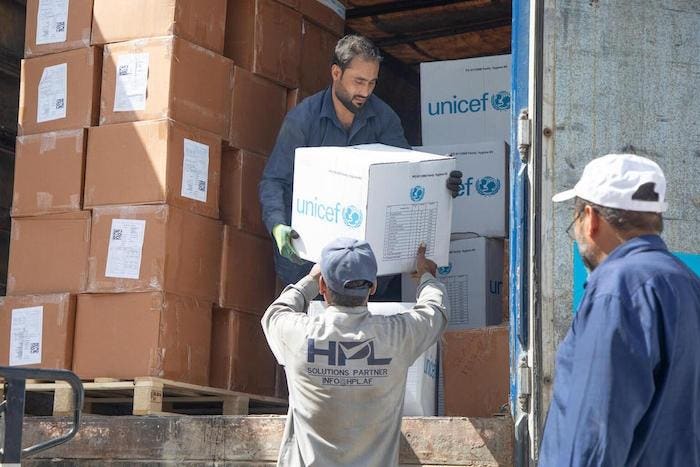UNICEF and partners are providing emergency supplies and services to children and families affected by a devastating earthquake in western Herat Province.
A magnitude 6.3 earthquake hit western Afghanistan’s Herat Province on Friday, Oct. 7, affecting at least 4,200 people — many of them children — including 1,400 who were already displaced, according to preliminary reports from OCHA, the United Nations Office for the Coordination of Humanitarian Affairs.
UNICEF Afghanistan staff are on the ground, working with UN colleagues to assess the full impact of the quake and its aftershocks, which were also felt in the neighboring provinces of Farah and Badghis.
UN humanitarian partners have initiated relief efforts, rushing medical and trauma support to regional hospitals, along with emergency shelter, food assistance and other supplies to affected areas.
The aftermath of an earthquake is often more deadly for children than the quake itself
To help children and families impacted by the quake, UNICEF is delivering emergency family hygiene kits containing essential items like bathing soap, laundry soap, a toothbrush and toothpaste, bath towel, sanitary pads and more. As of Oct. 7, UNICEF had already distributed 10,000 hygiene kits to earthquake-affected areas in Afghanistan, in addition to 15 emergency tents for overburdened health clinics, 1,500 sets of winter clothes and 10,000 tarpaulins for families who lost their homes.
A UNICEF WASH (water, sanitation and hygiene) response team has been deployed to mitigate the risk of a possible cholera outbreak in communities affected by the earthquake in Herat. Children in emergencies are at high risk of disease outbreaks, particularly waterborne illnesses like cholera.
UNICEF continues to deliver for children in Afghanistan
UNICEF has been on the ground in Afghanistan since 1949, working with partners to shore up essential services for children and to provide lifesaving support and protection for the most vulnerable. Children growing up in Afghanistan face chronic poverty, widespread food insecurity and a severely strained health care system.
More than 152,000 cases of acute watery diarrhea with dehydration — often caused by unsafe drinking water and poor sanitation and hygiene — were reported across 333 districts in Afghanistan this year as of August 2023. Of those, 87,242 (57 percent) were children under the age of 5. UNICEF continues to scale up health, WASH and social behavior change interventions in response.
The rate of extreme malnutrition in Afghanistan is very high: 9.5 percent. This year alone, UNICEF has screened more than 1.3 million children for acute malnutrition through mobile and fixed health facilities and treated more than 60,000 children suffering from severe acute malnutrition.
UNICEF’s humanitarian response in Afghanistan remains underfunded. Your contribution can make a difference for Afghanistan’s children. Please donate.
Read the full article here





